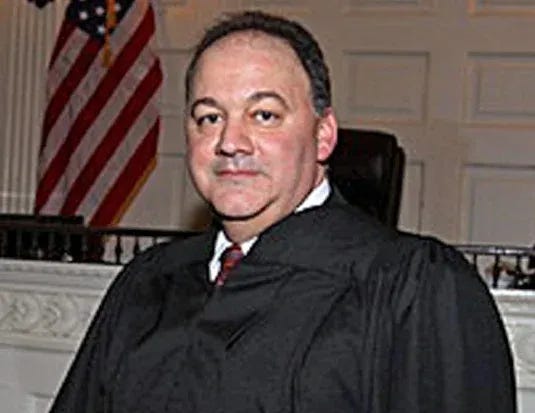By Richard Luthmann
In the latest episode of The Unknown Podcast, Michael Volpe and Richard Luthmann delivered a blistering critique of America’s judicial system, its eroding free speech protections, and the sweeping cultural shifts affecting media and discourse.
Over the course of an hour, the two delved into the high-stakes battles for constitutional rights, judicial accountability, and the role of alternative media in reshaping public dialogue.
Paul Boyne: A Free Speech Battle in Connecticut
The story of Paul Boyne loomed large in the discussion. Boyne, a blogger from Connecticut, has been jailed under accusations of cyberstalking and making “true threats” against judges. His blog, Family Court Circus, frequently criticizes the state’s judiciary, often using hyperbolic language that authorities have deemed threatening.
Paul Boyne's Case Demands a Legal 'Rabbi': Legal Expert Volokh Urged to Enter Boyne Free Speech Battle
NOTE: In the video above, I said I believed Eugene Volokh was a clerk for former U.S. Supreme Court Associate Justice Anthony Kennedy when, in fact, he clerked for former U.S. Supreme Court Associate Justice Sandra Day O’Connor.
Michael Volpe was unequivocal in his defense of Boyne, framing the case as a blatant attack on the First Amendment.
“Paul is in jail because the judiciary wants to silence him,” Volpe stated. “He didn’t send his blog posts directly to anyone. They sought them out. How is that harassment?”
Volpe and Luthmann drew parallels to the landmark 1969 Supreme Court case Watts v. United States. In Watts, a young man declared during a Vietnam War protest that his first bullet would be aimed at President Lyndon B. Johnson. The Court ruled that his statement was “political rhetoric,” not a true threat. Volpe argued that Boyne’s case is even less egregious.
“If the Watts case didn’t meet the threshold for a true threat, how can this?” he asked.
The duo also referenced Counterman v. Colorado, a 2023 case where the Supreme Court clarified that intent matters when determining whether speech constitutes a true threat.
“Paul’s writings are political critique,” Luthmann asserted. “This is about silencing someone who has exposed corruption.”
Adding intellectual heft to the conversation, the hosts discussed Eugene Volokh, a prominent First Amendment scholar who has written extensively about free speech and cyberstalking laws. Volokh has filed amicus briefs in similar cases, arguing against prosecutorial overreach. However, he has yet to weigh in on Boyne’s situation.
“Volokh’s input would carry weight,” Luthmann said. “He’s one of the foremost experts on First Amendment issues. Courts listen when he speaks.”
Volpe added, “If someone like Volokh doesn’t step in, cases like Boyne’s will set dangerous precedents for free speech.”
Weaponizing Jennifer’s Law in Connecticut
The conversation shifted to Connecticut’s Jennifer’s Law, enacted to protect victims of domestic violence. Instead, the statute has been twisted in family court to harm victims. One glaring example involves Christopher Ambrose, a lawyer and former Hollywood writer accused of molesting his adopted children.
Ambrose used Jennifer’s Law to accuse his ex-wife, Karen Riordan, of “coercive control.”
This tactic, Volpe and Luthmann argued, weaponizes the law against the very people it was meant to protect.
“Ambrose claimed that his ex-wife was coercing their children to file protective orders against him,” Luthmann explained. “The judge accepted this twisted logic and turned the law on its head.”
Judge Thomas O’Neill’s ruling shocked even seasoned court watchers.

“He essentially said that by going to the police, the mother was the real abuser,” Volpe noted. “It’s Orwellian.”
The hosts emphasized how vague legal terms like “coercive control” allow for such misuse.
“Control is inherently coercive,” Volpe said. “When you make the language so nebulous, it’s easy to manipulate. That’s what happened here.”
The Rise of Alternative Media
Amid the grim tales of judicial overreach, the hosts highlighted a positive cultural shift: the rise of alternative media. Volpe argued that long-form podcasts and independent platforms are eroding the influence of traditional outlets like CNN and Fox News.
“People want authenticity,” he said. “They’re tired of three-minute soundbites. They want in-depth discussions.”
Luthmann pointed to Joe Rogan as a prime example of this shift. Rogan, often mislabeled as a conservative, appeals to audiences across the political spectrum.
“Rogan’s success shows that people value independent voices,” Luthmann said. “He’s not a Republican or a Democrat. He’s a populist who’s skeptical of cancel culture.”
Volpe and Luthmann agreed that the media landscape is fracturing. Substack, podcasts, and niche platforms are flourishing as audiences seek alternatives to legacy media.
“This is the future,” Volpe said. “The gatekeepers are losing their grip.”
A First Amendment Battle in Morris County, NJ
Volpe and Luthmann discussed Monica Ciardi’s custody battle in Morris County, New Jersey. The case took a dramatic turn when her social media posts criticizing Judges James DeMarzo and Ralph Bogaard led to her arrest.
Authorities claimed her Facebook post—“Judge Bogaard and Judge DeMarzo: If you don’t do what I want then you don’t get to see your kids. Hmm.”—constituted a terroristic threat. Ciardi’s lawyer, Mackenzie Shearer, dismissed the charges as a misunderstanding.
“She was paraphrasing the judges’ own words,” Attorney Shearer explained. “She got arrested because she forgot quotation marks.”
The case has sparked a broader debate over free speech and judicial accountability. Ciardi, whose Facebook page had only 50 followers, questioned how her posts could be considered harassment.
“It’s like standing on someone’s porch, overhearing them talk about you, and calling it harassment,” Attorney Shearer said.
Volpe and Luthmann argued that Ciardi’s case is emblematic of a system increasingly intolerant of criticism. Her arrest followed a formal complaint she filed against Judge DeMarzo, leading Volpe to call the case “a retaliatory move to silence dissent.” Ciardi’s husband, Mark Doherty, agreed, labeling her detention “retaliatory torture” aimed at preventing her from continuing her online criticism.
Ciardi’s 35 days in jail were grueling. She endured panic attacks, weight loss, and exposure to violence in the Essex County Correctional Facility.
“When you’re innocent, you’re still treated like a criminal,” she said. Yet, Ciardi remains undeterred, stating, “Silence is consent, and I don’t consent.”
Luthmann warned that the silencing of dissent extends beyond individuals like Ciardi and is rampant in the family courts.
“I’m surprised more people haven’t ‘gone postal’ on corrupt family court judges,” Luthmann said. “This isn’t how you ‘fix’ the judicially-perceived problem.”
The hosts highlighted the case of Alabama attorney Beverly Barber, who faced disciplinary action after challenging judicial misconduct in family courts.
“She’s been practicing law since 2003 without a single complaint,” Volpe said. “Now, because she stood up to a corrupt system, they want to take her license.”
“Bar associations are weaponized to silence lawyers who challenge the system,” Luthmann argued.
Volpe added, “This isn’t about misconduct—it’s about punishing her for standing up to corruption.”
Volpe connected Ciardi’s case to a broader pattern, including the imprisonment of Connecticut blogger Paul Boyne for criticizing family court judges.
“These aren’t isolated incidents,” he said. “They’re part of a larger effort to stifle dissent.”
Luthmann compared the fight to historical First Amendment battles, saying, “If neo-Nazis had the right to march in Skokie, Illinois, then a mother has the right to criticize judges on Facebook.”
Both hosts emphasized the need for public awareness to combat judicial overreach. They pointed to successful campaigns in St. Louis County, Missouri, where organized efforts led to a significant drop in approval ratings for judges accused of misconduct.
“Change is possible,” Volpe said, “but it takes sustained effort.”
On Ciardi, Luthmann concluded, “This case is a litmus test for the First Amendment. If we allow this overreach to stand, we risk losing our most fundamental freedoms.
The Fight Ahead
Despite the bleak outlook, Volpe and Luthmann found hope in grassroots movements. They highlighted judicial retention elections in St. Louis County, Missouri, where public awareness campaigns significantly reduced judges’ approval ratings.
“It shows that sustained efforts can make a difference,” Volpe said.
Luthmann emphasized the need for organized action.
“We need PACs to fund these efforts,” he said. “Judicial accountability won’t happen without resources and strategy.”
The Stakes for Free Speech
The podcast’s central theme was clear: the fight for free speech is at a critical juncture. Cases like Paul Boyne’s, Monica Ciardi’s, and Beverly Barber’s reveal a dangerous trend of using legal systems to silence dissent illegally.
“The First Amendment is under siege,” Volpe warned. “If we don’t stand up now, we risk losing one of our most fundamental rights.”
As Volpe and Luthmann wrapped up, they promised to keep shining a light on these issues. For them, The Unknown Podcast is more than a platform—it’s a mission to expose injustice and empower listeners to demand change.

























Share this post